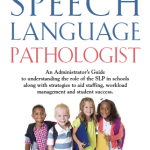How SLPs can deal with Middle School rudeness

I received a question from a middle school therapist asking if I had any suggestions on how to deal with rude disrespectful students. No other information than that in terms of community, severity of students, size of groups or gender. From my 15 plus years of experience at the middle school level I think I relate to the situation she might be in. I’m going to assume her students are mainly boys and basically language/learning disabled students.
Three things to consider. First, Speech Language Pathologists do not also have to be experts in behavior. We have enough on our plate. Second, the rules have changed just in the past few years and we are not always allowed to use our professional judgement on who will continue to benefit from therapy and who will not. Third, middle schoolers specialize in rudeness, but it shouldn’t be consistent.
As few as 5 years ago I was able to go into a middle school annual review meeting, explain any behavioral difficulties that might be going on. I would proceed to tell the parent that the student isn’t working in therapy and not really getting anything out of it. Parents usually realized the issue because they were dealing with similar behaviors or complaints at home. We kept any language accommodations and modifications in place but the student was officially discharged from therapy. These days students have to “test out” of therapy before they can be discharged. We all know that “testing out” rarely happens for our language kids. Hence our professional judgement is ignored by the system. However, at least at a 3 year reevaluation you can bring up concerns around not continuing to benefit from services.
They are middle school aged children and figure if they keep behaving badly they eventually won’t have to go to therapy. Keep in mind that these children are probably having considerable difficulty in middle school as the language demands in all subjects quickly becomes more difficult. Going to therapy isn’t cool. I’ve been fortunate to work in schools for the past 20 or so years that have been on the cutting edge of integration services. Most kids accept each other and do not pay much attention to the limitations of typical language/learning disabled students. You might want to consider your schools history in terms of special education integration.
I use to be able to tempt the students with food treats once in a while. However, that was before all the food rules schools now have. A granola bar, cookies, dum dum pops or a stick of gum went a long way. By feeding them it showed I cared. It was something special to look forward to and most middle schoolers are hungry all the time.
Some middle school students that were embarrassed to be in speech therapy, especially if someone had the bight idea for me to see them in the classroom. Rudeness could be the result of embarrassment.
If you think you students are embarrassed about having to go to therapy here are some suggestions.
- Talk to them about therapy, what they are working on, who made the decision that they would have to see you (yes include parents), try to do pull out therapy whenever possible. Polling my middle school students over the years, few wanted me breathing down their necks, in the classroom with their friends watching.
- Spend time working gently on raising awareness of their language needs
- Don’t label your door if you don’t have to. If you do just put your name.
- I think all therapy rooms should have windows in their doors but make the student’s seat placement outside the view of the window so their friends don’t see them.
- Explain any scheduling decisions
- Don’t show up at the classroom door to pick them up, make a phone call to class instead.
Here are some other suggestions you might try
- If the groups aren’t working try changing them up (I realize that is easier said than done because our scheduling is based on the school schedule). Are your groups too big to manage?
- Try changing your therapy methods to make activities more fun. Throw in a game once in a while, even if it is a game that has little to no educational value.
- Laugh with your students. I created a joke curriculum that focused on many aspects of ambiguous and figurative language along with vocabulary.
- Occasionally give them a day off, especially if there is something going on in class that they want to be part of. Cut session short once in awhile, they like that. (this of course depends how strict your administration is on comp services)
- Be firm, make it clear that you are tired of their rudeness. It’s ok to use your mean teacher voice when necessary. Follow up with an activity that they like then thank them for their cooperation or tell them this was a fun group.
- Occasionally bring in classwork and let them finish homework, help them muddle through a book they’re reading.
- Design some activities where they can get up and move around. A white board comes in very handy for this.
If these suggestions don’t have any effect, its time to bring your issues to the principal or vice principal. It might be a good issue to pose to teachers at staff meeting. Teachers and counsellors might be able to provide some insight or even support. At the very least you’ll find out if this is a general school issue or individual specific. More than likely these kids are rude everywhere not just in therapy.
As mentioned earlier middle schoolers specialize in rudeness. Our language disabled students have difficulty knowing when it might be ok to be rude and when it isn’t. Most middle schoolers will not be blatantly rude to adults other than their parents but it does happen. Keep in mind they’re a bundle full of hormones and sometimes can’t help it. Rudeness shouldn’t happen on a consistent basis. If you see a problem try talking privately to the student about it or if you know there are issues mention it to the guidance counsellors/school psychologists.
Middle School Therapists, please feel free to add any additional suggestions
Good Luck
Professional Liability for SLPs









I realize this is an old post but I am curious what state you are in. I am finishing up my first year a school but I have never been told a student had to “test out” I dismissed a student going to middle school because I argued he would be getting language instruction through the resource classroom and he had absolutely no motivation to come to speech anyway. I would had a ridiculous caseload if every student had to test out!
Massachusetts. There are ways around it but parents really have to be on board. You would also have to prove that the language support in middle school would cover language deficits….I’ve worked in several middle schools and that is rarely true